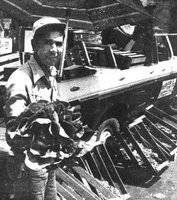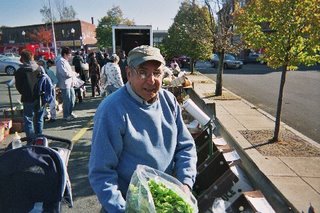Founding Farmer
 In 1978, I was asked by Susan Redlich, the visionary director of the Massachusetts Department of Food & Agriculture's Division of Agricultural Land Use, to help organize a network of farmers' markets in the Greater Boston Metropolitan area.
In 1978, I was asked by Susan Redlich, the visionary director of the Massachusetts Department of Food & Agriculture's Division of Agricultural Land Use, to help organize a network of farmers' markets in the Greater Boston Metropolitan area.Two years earlier, the Department, under the leadership of commissioner Frederick Winthrop had released "A Policy for Food and Agriculture" for the Commonwealth. The state was, on average, losing 200 farms a year -- and had been since the end of the Second World War.
Winthrop had determined that providing Massachusetts farmers with more direct-marketing opportunities might be one way to keep them in business. By selling directly to consumers from the backs of their trucks or makeshift stands set up in the heart of Boston city neighborhoods, farmers would be able to bypass wholesalers and thereby increase their profits while maintaining reasonable prices.
This seemed like a win-win situation to me, so I eagerly took the job and working with intern Michael Grunebaum, a junior from Buckingham, Brown & Nichols high school set out identifying sites deep within the heart of Boston to host weekly farmers' markets.
One of these sites was Fields Corner in Dorchester. A local grassroots community gardening group called Dorchester Gardenlands Preserve took the ball and got permission to block off a section of the city's main street -- Dorchester Avenue -- on Saturday mornings so that farmers could drive their trucks in, park and sell their produce.
 In June, Ken Moll, head of the newly formed Massachusetts Federation of Farmers Markets and I drove to the western part of the state to recruit farmers for the Boston farmers' market. We gave them our best sales pitch about the benefits of selling direct to their urban neighbors.
In June, Ken Moll, head of the newly formed Massachusetts Federation of Farmers Markets and I drove to the western part of the state to recruit farmers for the Boston farmers' market. We gave them our best sales pitch about the benefits of selling direct to their urban neighbors.For a variety of reasons, this turned out to be much more difficult than we envisioned. Nonetheless, a week before the scheduled grand opening of the Fields Corner Farmers' Market we had pledges from roughly 20 farmers who said they'd show up.
Opening day was Saturday, July 9, 1978. Commissioner Winthrop was there. So was Massachusetts Lt. Governor, Thomas P. O'Neill III (Son of Tip). Television crews arrived shouldering cameras and with microphones readied, and newspaper reporters were there with pens and pads in hand. And oh yes, throngs of customers -- many who even brought their own shopping bags.
The only problem was there were no farmers. Apparently they all had second thoughts about driving into Boston.
Michael and I stood in the middle of the empty street nervously wondering if we'd have a job on Monday. Ken Moll arrived in his VW Bug with vegetables from his garden to sell, but that didn't satisfy many in the crowd who wanted to see "real farmers".
Finally, about 45 minutes after the opening of the market, just when grumbling camera crews and newspaper reporters were packing up to leave, a pickup truck came rumbling down Dorchester Avenue.
It was Kachie Berberien (top photo) and his family from Northboro, Massachusetts. His truck runneth over with lettuce, chard, radishes and zucchini. He saved the day, and I'm convinced the Boston Farmers' Market project in the process. From that day on, farmers' markets have blosssomed throughout the city and around state (there are currently more than 130).
Two days ago, a friend of mine Hugh Joseph sent an email with photos attached. The photos were taken at the Dorchester Farmers' Market a week or so earlier.
And lo and behold, there was Kachie, now 82 year young, still selling his lettuce and apparently still loving every minute of it. (GW)


0 Comments:
Post a Comment
<< Home